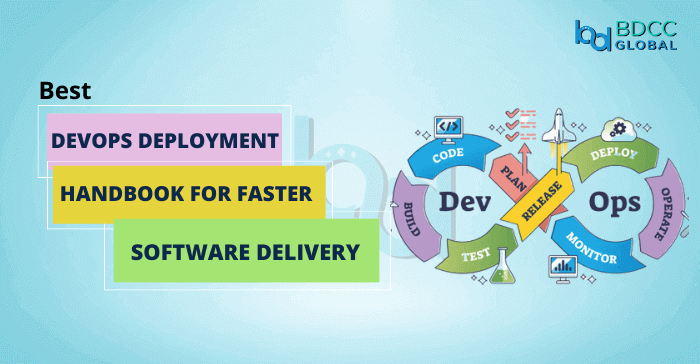
Has your organization adopted the DevOps Deployment approach yet?
If the answer is NO, your organization may be slowing down with:
1. Slower time-to-market
2. Lower-quality software delivery
3. Higher development costs
4. Lack of innovation with limited agility
5. Poor customer satisfaction
It’s time to transform with a well-planned DevOps Culture promoting continuous delivery. Being the best Agile Methodology, DevOps is the perfect solution to automate SDLC stages. It integrates software development with CI/CD operations to enable faster delivery.
So if you plan to start your DevOps journey, this guide is for you! From planning to deployment, we will discuss how to perform a successful DevOps Deployment in your organization.
Planning DevOps Implementation Roadmap
It is the first step in the DevOps Development process. During this stage, you must define your project requirements, set your goals, and plan the development roadmap. For that, you can perform these activities:
- Identify what software features you want to offer to your target audience.
- Identify the specific goals for DevOps deployments that you want to achieve. For example, faster delivery of software, improved product quality, etc.
- Prepare for the development process by selecting suitable development tools and methodology. Define the core responsibilities among developers, software testers, and operations teams.
Designing The Underlying Infrastructure
After planning the roadmap, it’s time to design the infrastructure architecture for the ultimate DevOps transformation. In this phase, you should focus on selecting and configuring the appropriate technology to support the software development activities.
- Select suitable tools, technologies, and frameworks that match your development requirements.
- Configure a scalable infrastructure that can support hardware requirements for Continuous Delivery.
- Define the CI/CD pipelines to automate the process of code deployment and feature releases.
- Ensure all components, including code repositories, testing frameworks, and CI/CD tools, work together seamlessly.
You must identify the key DevOps design metrics to measure the implementation success. It will help you align the mobile web development goals with organizational objectives.
Proceeding With DevOps Development
In the development stage, you should build the software with the following activities:
- Create your code from scratch using the pre-selected development tools.
- Test your code using suitable frameworks to confirm if it works as expected.
- Perform testing at different stages of development like Unit Testing and Acceptance Testing.
- Integrate your code with other software components using a version control system like Git.
In case you find it challenging to manage code changes, take assistance from professional DevOps service providers. They will ensure that your code stays in a deployable state always.
Integrating DevOps Implementation
In the Integration Phase, you need to perform the following activities to ensure that the system works properly:
- Establish effective communication with other system components in the environment.
- Test the integration with other platforms and third-party systems to ensure everything works as expected.
- Test DevOps service compatibility and functionality to identify potential issues and code defects.
- Use GitHub for version control and keep repository backups of different code versions.
Once all system components have been integrated with other systems, the DevOps Implementation is ready for deployment. You need to ensure that the deployment process is smooth and error-free for the end users.
Finishing DevOps Deployment
This is the ultimate stage where you release your software to your customers. In this stage, you need to perform the following activities:
- Prepare for the software or product feature releases with all the necessary resources.
- Deploy your software using automation tools like Azure DevOps to testing, staging, and production environments.
- Monitor your software performance to resolve the pre-identified issues and implement code fixes.
You can opt for professional DevOps consulting services to maintain your software and ensure that it continues to meet your customers’ requirements. The professionals will fix any issues that arise and make improvements to software performance.
Potential Challenges in DevOps Development
Organizations can face a range of challenges during a DevOps Culture Transformation. Some of the most common ones include:
- Need for more automation frameworks, tools, and technology.
- Lack of technical expertise to utilize new technology like containers and microservices.
- Complex collaboration channels between software developers, testers, and operations teams.
- Ensuring the protection of essential data with adequate security measures.
Despite these challenges, any experienced DevOps services company like Algoworks can carefully plan and execute a successful DevOps transition roadmap. Hence, you can consult professionals to find the best DevOps implementation solutions.
Summing Up
DevOps is an Agile Approach that integrates software development and operations to enable Continuous Software Delivery. The process involves five stages: roadmap planning, infrastructure designing, development, system integration, and DevOps deployment. By following these steps, you can ensure smooth software deployment and release processes. However, you can always take guidance from expert DevOps professionals!
BDCC
Latest posts by BDCC (see all)
- Cloud computing in healthcare: Uses and benefits - June 23, 2025
- What are the Best Practices for Terraform File Structure? - June 10, 2025
- From Monolith to Microservices: DevOps Strategies For a Smooth Transition - June 5, 2025

